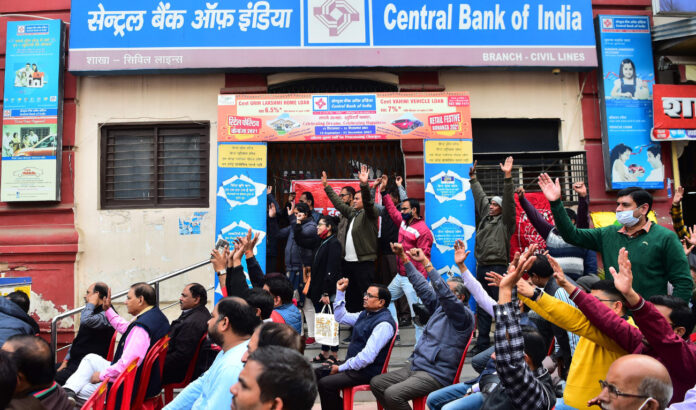NEW DELHI: India’s banking system was disrupted for a second consecutive day on Friday as more than 900,000 of those working in the country’s public banking sector continued their strike in protest at the government’s decision to privatize state-owned banks.
The Indian government is reportedly looking to gradually privatize all 12 of its public-sector banks, which control more than 80 percent of the country’s financial transactions. Finance Minister Nirmala Sitharaman announced in March that two of them would be selected for sale in the current financial year.
To facilitate the privatization process, the government has listed the Banking Laws (Amendment) Bill, 2021, for introduction and passage during the ongoing winter session of parliament. The United Forum of Bank Unions, an umbrella body of nine bank unions, believes that privatizing banks will significantly weaken India’s economy. It organized the two-day strike after negotiations with the government failed.
“We held talks with the government, but the government refused to give us any assurances; that’s why we had to launch the strike,” Jatinder Pal Singh, president of the State Bank of India Officers’ Association in Delhi, told Arab News.
“Public sector banks have been the backbone of the country’s economy, as well as its financial structure,” he said. “All social and economic schemes of the government have been implemented successfully by public-sector banks and they have a deep reach across the country.”
Public sector banks are seen as vital for the implementation of government initiatives such as expanding rural credit, he noted.
“If these banks are privatized, our poor people and common people will be deprived of banking services,” Singh said. “Private sector banks are not bothered about social responsibility.”
Sanjeev Kumar Bandlish, general secretary of the All India State Bank of India Staff Federation, said there was no guarantee that private sector banks would not collapse and that by privatizing profit-making public sector banks the government is “putting people’s money at risk.”
When Yes Bank, a prominent private sector bank, collapsed in March last year, it was rescued by the State Bank of India, which acquired a 49-percent stake in the lender.
“In 2008, when the global economic meltdown took place, the Indian economy (survived) because of public-sector banks,” Bandlish told Arab News. “Then-Prime Minister Dr. Manmohan Singh and Finance Minister P. Chidambaram said this in parliament.”
The government was expected to present the amended banking bill in parliament on Friday, but it did not, with local media reports suggesting that new discussions on the privatization issue were underway with the country’s central bank, the Reserve Bank of India (RBI).
Officials at the Ministry of Finance were unavailable for comment despite repeated attempts on Friday to reach them.
New Delhi wants to overhaul the banking sector to shore up government revenues as the financial effects of the COVID-19 pandemic continue to make themselves felt. But it is a politically risky move, because it could put hundreds of thousands of jobs at risk.
“Privatization will lead to more unemployment at a time when the economy is already in distress and there is a dip in household income,” veteran economist Prof. Arun Kumar of Jawaharlal Nehru University in New Delhi told Arab News.
“The pandemic has shown how public-sector banks support marginalized people and the rural populace,” he said. “The need is to strengthen the public sector rather than weaken it.”
India approves $10bn plan to lure semiconductor and display makers

